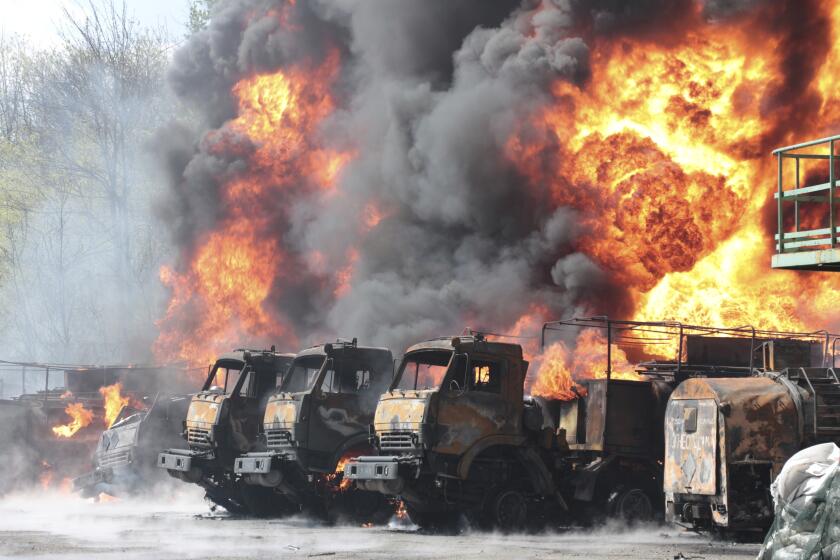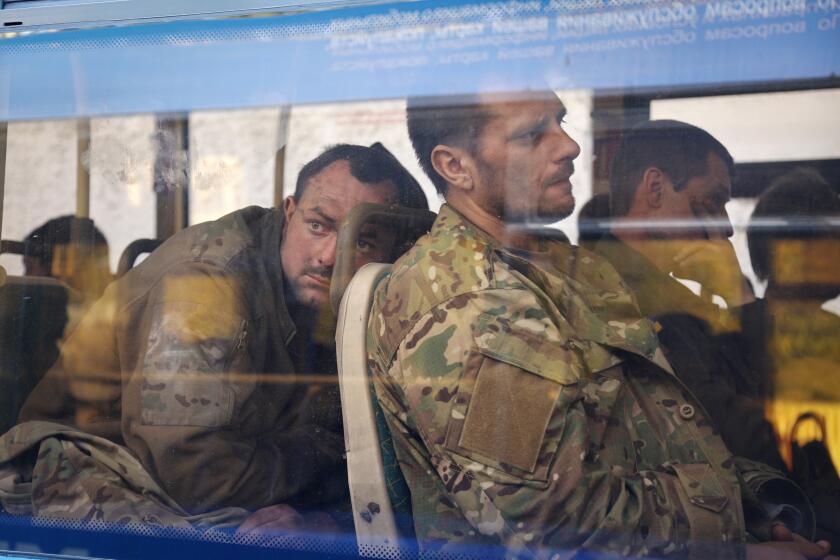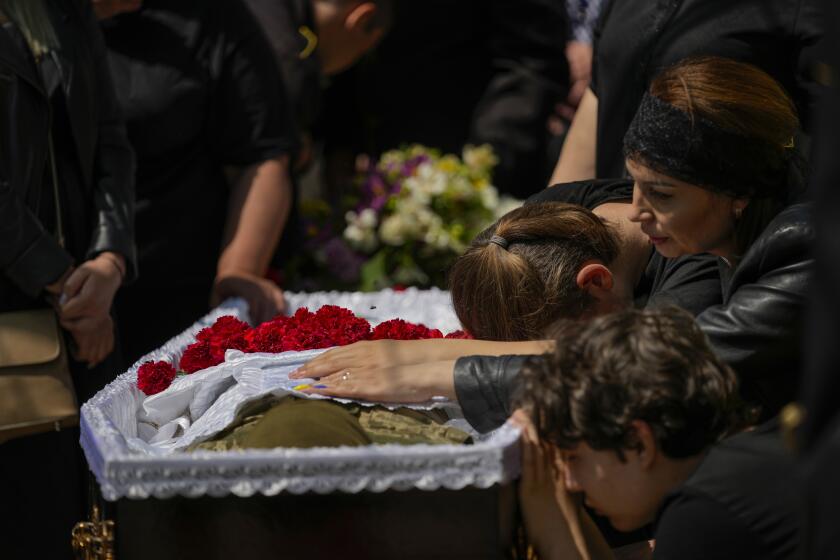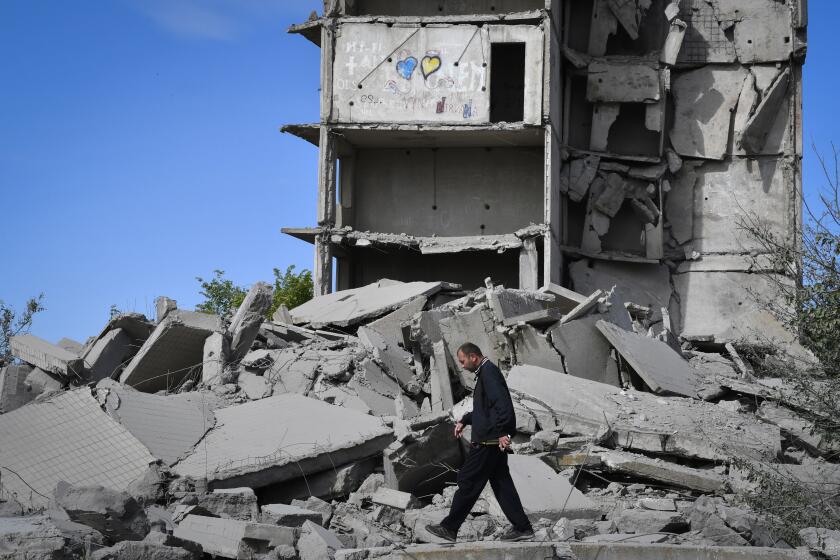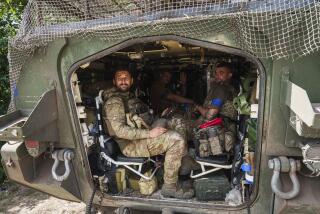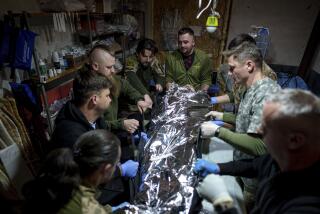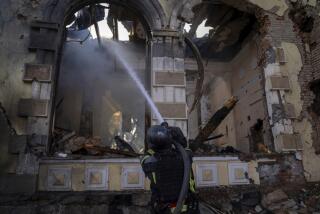Street fighting rages in key east Ukrainian city that lies ‘completely ruined’
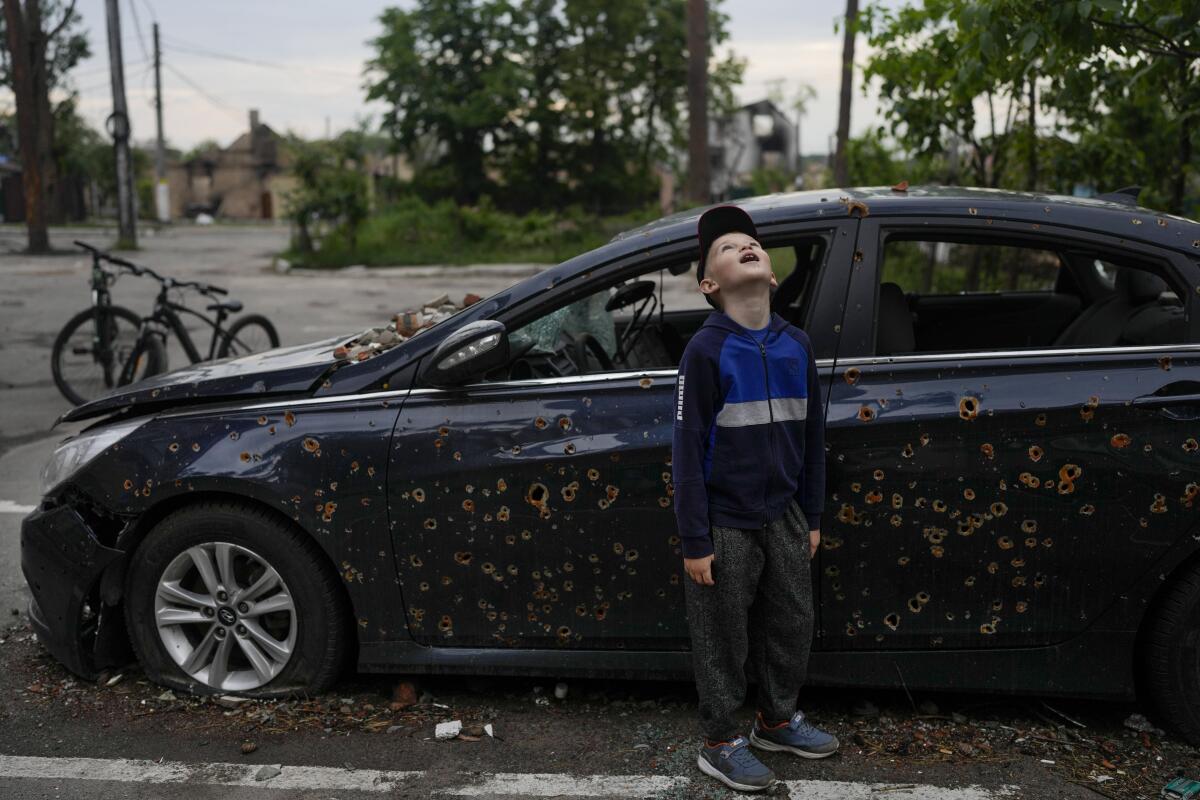
KRAMATORSK, Ukraine — Russian troops pushed deeper into a key eastern Ukrainian city Monday, fighting street by street with Kyiv’s forces in a battle that has left Severodonetsk in ruins. In a bid to pressure Moscow to end the war, the European Union agreed to embargo most Russian oil imports by the end of the year.
As Moscow’s advance on Severodonetsk increased in intensity, Russian forces also shelled parts of Ukraine’s northeast, and a struggle continued for control of a southern region. Ukrainian President Volodymyr Zelensky, meanwhile, said Russia has prevented the export of 22 million tons of Ukrainian grain, contributing to a growing global food crisis.
Military analysts painted the fight for Severodonetsk as part of a race against time for the Kremlin. The city is key to Russian efforts to complete the capture of the eastern industrial region of the Donbas quickly — before more Western arms arrive to bolster Ukraine’s defense.
Weapons from the West have already helped Kyiv’s forces thwart a Russian advance on the capital in the early weeks of the war. That failure forced Moscow to withdraw, regroup, and pursue the more limited objective of seizing the Donbas, where Moscow-backed separatists already held swaths of territory and have been fighting Ukrainian troops for eight years.
“The Kremlin has reckoned that it can’t afford to waste time and should use the last chance to extend the separatist-controlled territory because the arrival of Western weapons in Ukraine could make it impossible,” Ukrainian military analyst Oleh Zhdanov said.
In a potential setback for Ukraine, President Biden appeared to dismiss reports that the U.S. was considering sending long-range rocket systems to the country.
But the European Union approved additional sanctions on Russia. As part of a long-delayed financial support package to help Ukraine, EU leaders agreed Monday to embargo most Russian oil imports into the 27-nation bloc by the end of the year. The agreement came after Zelensky asked the EU to target Russian oil exports so Moscow “feels the price for what it is doing against Ukraine.”
The embargo covers Russian oil brought in by sea, allowing a temporary exemption for imports delivered by pipeline. EU Council President Charles Michel said the agreement covers more than two-thirds of oil imports from Russia. Ursula von der Leyen, the head of the EU’s executive branch, said the move will “effectively cut around 90% of oil imports from Russia to the EU by the end of the year.”
In an effort to punish and divide the West over its support for Ukraine, Russia has cut off natural gas to a handful of European countries. In its latest move, Russian state gas giant Gazprom said it will halt gas supplies to Dutch gas trader GasTerra starting Tuesday.
Russia also ramped up its actions on the battlefield. In his nightly video address, Zelensky said the situation in the Donbas remains “extremely difficult” as Russia has put its army’s “maximum combat power” there.
The Ukrainian military said Russian forces reinforced their positions outside Severodonetsk, a city 90 miles south of the Russian border in an area that is the last pocket of Ukrainian government control in Luhansk.
Severodonetsk Mayor Oleksandr Striuk said the city has been “completely ruined.” Artillery fire has destroyed critical infrastructure and damaged 90% of the buildings, and power and communications have been largely cut to a city that was once home to 100,000 people, he said.
Moscow’s forces take aim at Ukrainian infrastructure and Western weapons shipments as the European Union considers phasing out Russian oil imports.
“The number of victims is rising every hour, but we are unable to count the dead and the wounded amid the street fighting,” Striuk told the Associated Press in a phone interview, adding that Moscow’s troops advanced a few more blocks toward the city center.
Russia scores its first major win with the takeover of the Ukrainian port city of Mariupol. But will it change the course of the war?
He said that only about 12,000 to 13,000 residents remain, sheltering in basements and bunkers to escape the Russian bombardment — a situation that recalls the siege of Mariupol that trapped residents and led to some of the worst suffering of the war.
Striuk estimated that 1,500 civilians have died in his city since the war began, from Russian attacks as well as from the dire conditions, including a lack of medicine or medical treatment. More than 20,000 are feared dead in Mariupol.
A 32-year-old French journalist, Frederic Leclerc-Imhoff, died Monday near Severodonetsk when he was hit by shrapnel from shelling while covering Ukrainians evacuating the area, according to his employer, French broadcaster BFM TV.
Beyond long sieges of cities, Russia’s troops have also been accused of carrying out targeted killings and other atrocities in areas they briefly held around Kyiv early in the war. On Monday, prosecutors submitted the first rape case of the war to a court — the last step before a trial begins. A 31-year-old Russian soldier is accused of killing a man and raping his wife in Bohdanivka, a village northeast of Kyiv, officials said.
The soldier’s whereabouts aren’t known and he will be tried in absentia, prosecutors said.
After months of a devastating siege, the city of Mariupol is now in Russian hands as Moscow’s forces concentrate their attacks elsewhere.
Luhansk Gov. Serhiy Haidai said the Russians were also pushing toward nearby Lysychansk. In addition to the journalist, two civilians were killed and five others were wounded in the latest Russian shelling, he said.
The Russian advance in Severodonetsk and Lysychansk on either side of the strategically important Seversky Donets River
is part of an all-out push, Zhdanov said.
The intensity of the latest fighting and the fact that Russia has poured troops in from its far east have come as a surprise to the Ukrainians, who are trying to hold out until more weapons can arrive, Zhdanov said.
“The Ukrainian army can’t afford losing as many soldiers as the Russians,” Zhdanov said. “The Ukrainians hope that Russia will run out of steam soon.”
The Russians are taking advantage of the slow delivery of additional weapons and making up for difficulties their forces had early in the war, said Mykola Sunhurovskyi, a military expert at the Kyiv-based Razumkov Center think tank.
“Russia clearly has been trying to take revenge for its past failures in Ukraine and achieve at least some of its goals,” Sunhurovskyi said.
On Monday, Biden told reporters that there are no plans for the U.S. to send long-range rocket systems to Ukraine, amid reports that the move is being considered.
Dmitry Medvedev, the deputy head of Russia’s Security Council, said that was a “reasonable” decision.
He said that “otherwise, if our cities come under attack, the Russian armed forces would fulfill their threat and strike the centers where such criminal decisions are made.”
Medvedev added that “some of them aren’t in Kyiv.”
Russian pressure also continued in the south Monday. Defense Ministry spokesman Igor Konashenkov said an artillery strike on a shipyard in the southern port of Mykolaiv destroyed Ukrainian armored vehicles parked there.
In the Kherson region, the Russia-installed deputy head of the regional administration, Kirill Stremousov, told Russia’s Tass state news agency that grain from last year’s harvest is being delivered to Russian buyers, adding that “obviously there is a lot of grain here.” Ukraine has accused Russia of looting grain from territories its forces hold, and the U.S. has alleged Moscow is jeopardizing global food supplies by preventing Ukraine from exporting its harvest.
Ukraine is one of the world’s largest exporters of wheat, corn and sunflower oil, but the war has prevented most of those products from getting out.
Russia, meanwhile, has pressed the West to lift sanctions against it as it seeks to shift the blame for the growing food crisis — which has led to skyrocketing prices in Africa.
Zelensky urged France not to succumb to such “blackmail” as the Ukrainian president met Monday with French Foreign Minister Catherine Colonna.
More to Read
Sign up for Essential California
The most important California stories and recommendations in your inbox every morning.
You may occasionally receive promotional content from the Los Angeles Times.
